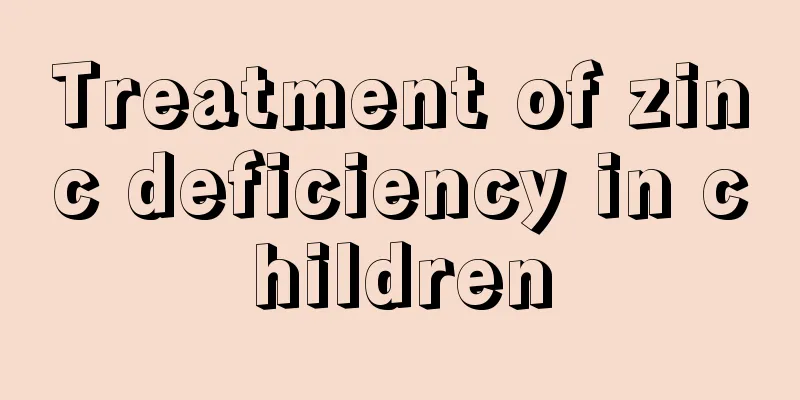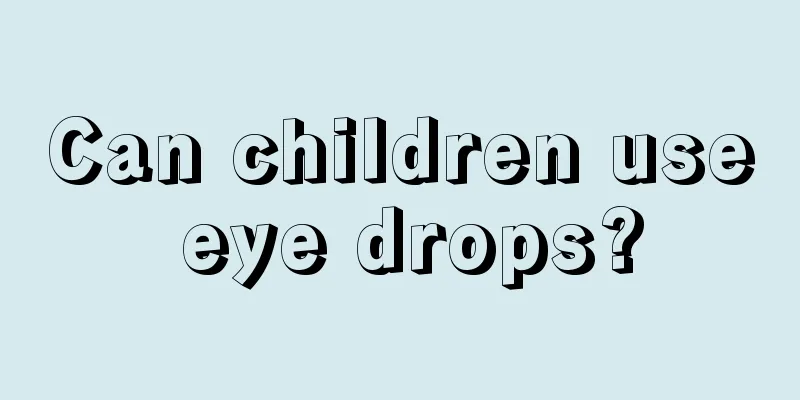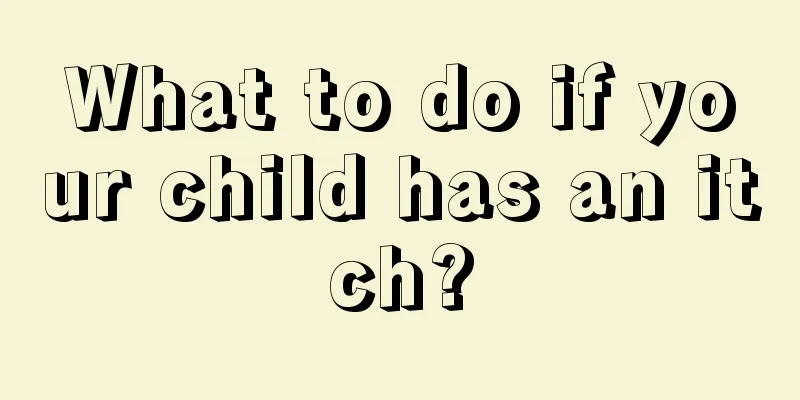Treatment of zinc deficiency in children

|
If a child is zinc deficient, he or she will have trouble sleeping and eating, which is very harmful to the child's physical development. If a child does not eat for a long time due to zinc deficiency, the child's body will gradually become thinner, and the child's immunity will continue to decline. The child is likely to suffer from some adverse diseases. So how should we treat children with zinc deficiency? Zinc deficiency affects the growth and development of infants, preschoolers and pre-adolescents. They can take 0.5-1.5 mg/kg of zinc (calculated as elemental zinc) orally every day. The recommended daily zinc intake should be doubled. The maximum dose is 20 mg per day. The course of treatment is 3 months. For mild cases, it can be shorter. Zinc sulfate, zinc gluconate or zinc acetate can be used. For secondary zinc deficiency, the dosage of zinc varies depending on the severity of malabsorption and excessive loss. It can be started with 1 mg/kg per day. In order to meet the needs of rapid growth, if infants and young children continue to lose too much, the daily dosage can be increased to 2 mg/kg, but the plasma zinc level should be closely monitored. The recommended dose of zinc for enteropathic acroparesis is 0.4 mg/kg per day for premature infants, 0.2 mg/kg per day for full-term infants under 3 months old, 0.1 mg/kg per day for older infants and toddlers, and 0.05 mg/kg per day for children. When excessive zinc loss occurs, especially from the gastrointestinal tract, the dosage needs to be increased. Plasma zinc should be monitored over time. When there are severe signs of zinc deficiency, 0.3 to 0.5 mg/kg of zinc can be given intravenously daily until the skin lesions disappear and plasma zinc levels remain high. Excessive zinc application can lead to a decrease in plasma copper. To facilitate zinc absorption, oral zinc preparations are best taken 1 to 2 hours before meals. Anorexia and pica caused by low zinc usually take effect after 2 to 4 weeks of zinc supplementation, and take effect after 1 to 3 months of growth retardation. Zinc supplements are ineffective for conditions not caused by zinc deficiency. When using zinc agents for treatment, the efficacy and side effects should be observed at all times, plasma zinc should be monitored, and zinc-rich foods should be increased. Except in special circumstances such as acrodermatitis enteropathica or total parenteral nutrition, the medication should be discontinued promptly. The side effects of zinc sulfate and other zinc preparations include gastrointestinal symptoms such as nausea, vomiting, and diarrhea. Taking zinc after meals can reduce the side effects. The foods we eat daily that contain more zinc include oysters, pancreas, liver, blood, lean meat, eggs, whole grains, walnuts, peanuts, watermelon seeds, etc. Generally, vegetables, fruits, and grains contain zinc. As long as the diet is arranged properly, zinc deficiency will generally not occur. These foods are rich in zinc: lean beef, pork, lamb, chicken hearts, fish, oysters, egg yolks, skimmed milk powder, wheat germ, sesame, walnuts, oyster beans, peanuts, millet, and radish. Animal foods generally contain much more zinc than plant foods and are more easily absorbed. Oysters have the highest zinc content, and other shellfish are also rich in zinc. Mothers can stew some seafood soup for older babies, such as scallops, conchs, clams, etc. Animal livers also have high zinc content. Chop duck liver or chicken liver into small pieces and add egg yolk to make a pureed complementary food, which is more suitable for younger babies. For babies who don’t like to eat meat, common vegetables and fruits also contain zinc, and nuts such as peanuts, walnuts, and chestnuts are also the best choice for vegetarian babies to supplement zinc. The above is an introduction to some diets, and these foods are of great help to children's bodies. If children are zinc deficient, these foods can come in handy, but if a child is zinc deficient, it depends on whether the child's condition is really serious. If the symptoms are severe, then the child should be given medication to improve the condition, such as zinc gluconate oral solution. This zinc supplementation effect is very good, and let the child get more sun exposure. |
<<: What is the cause of anemia in a five-month-old baby?
>>: What to eat for children with iron deficiency anemia
Recommend
Why does the baby twitch when feeding?
Generally speaking, infants' nutritional need...
What should I do if my child has stomach pain and vomiting?
When children are young, their resistance is rela...
What to do if your baby has a fever and runny nose
Babies having fever and runny nose is a situation...
What causes cerebral palsy in children?
Generally speaking, cerebral palsy in children st...
What to do if your child has neurogenic urinary frequency
Frequent urination is a very common symptom in ou...
What are the new treatments for cerebral palsy in children?
Due to the influence of the environment, many chi...
What are the reasons that cause children to be hyperactive?
The growth and development of children is the iss...
When should children's supernumerary teeth be extracted?
Dental health is a very important matter. Many pe...
What may cause urticaria in children?
When children suffer from urticaria, it is actual...
What to do if your baby has high trace element lead
Lead is also a common trace element in the human ...
If children's rhinitis is not treated, there will be these consequences
Rhinitis refers to a nasal disease manifested by ...
What are the reasons for children's recent loss of appetite?
Many parents have found that their children have ...
What is the cause of neonatal bowel sounds?
Every baby comes into this world with the expecta...
Symptoms of mental retardation
As children grow up, parents need to understand a...
What are the scientific methods to help children grow taller?
I believe every parent hopes that their child can...









